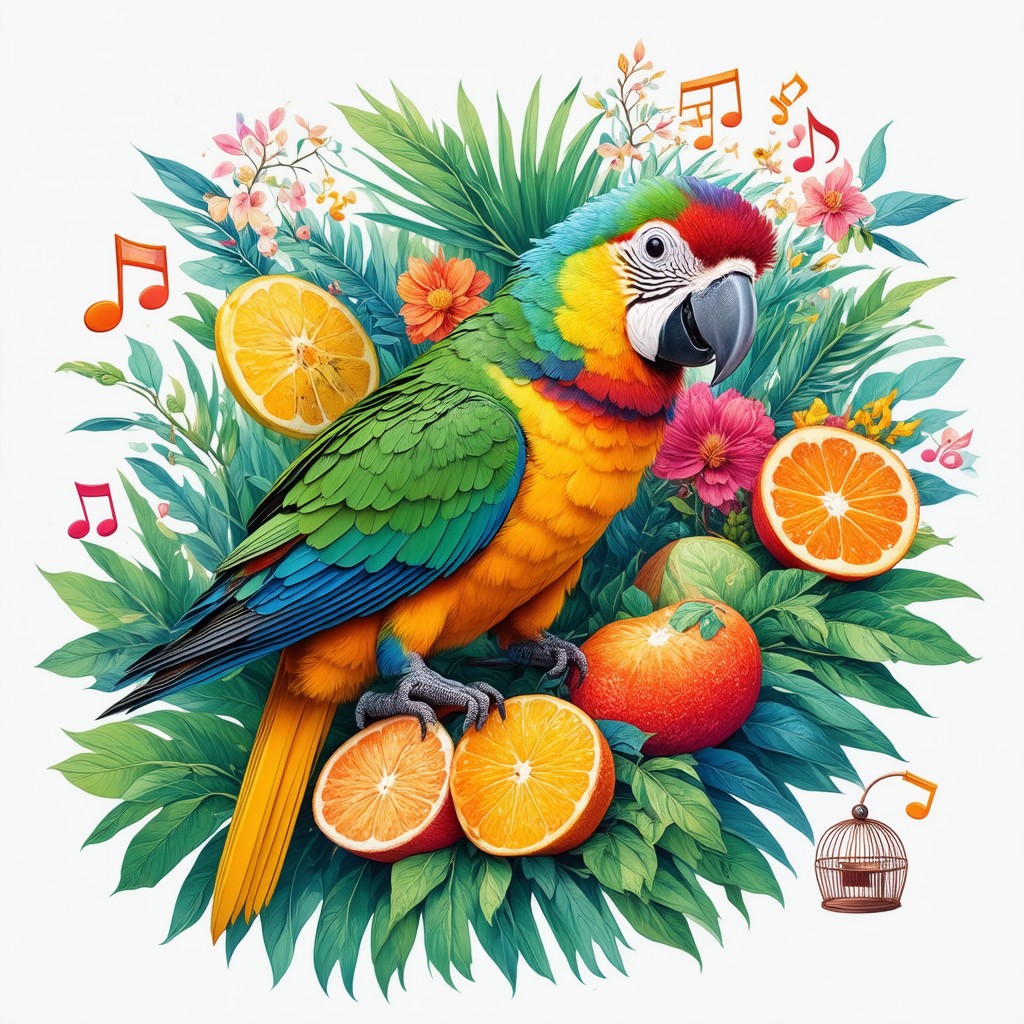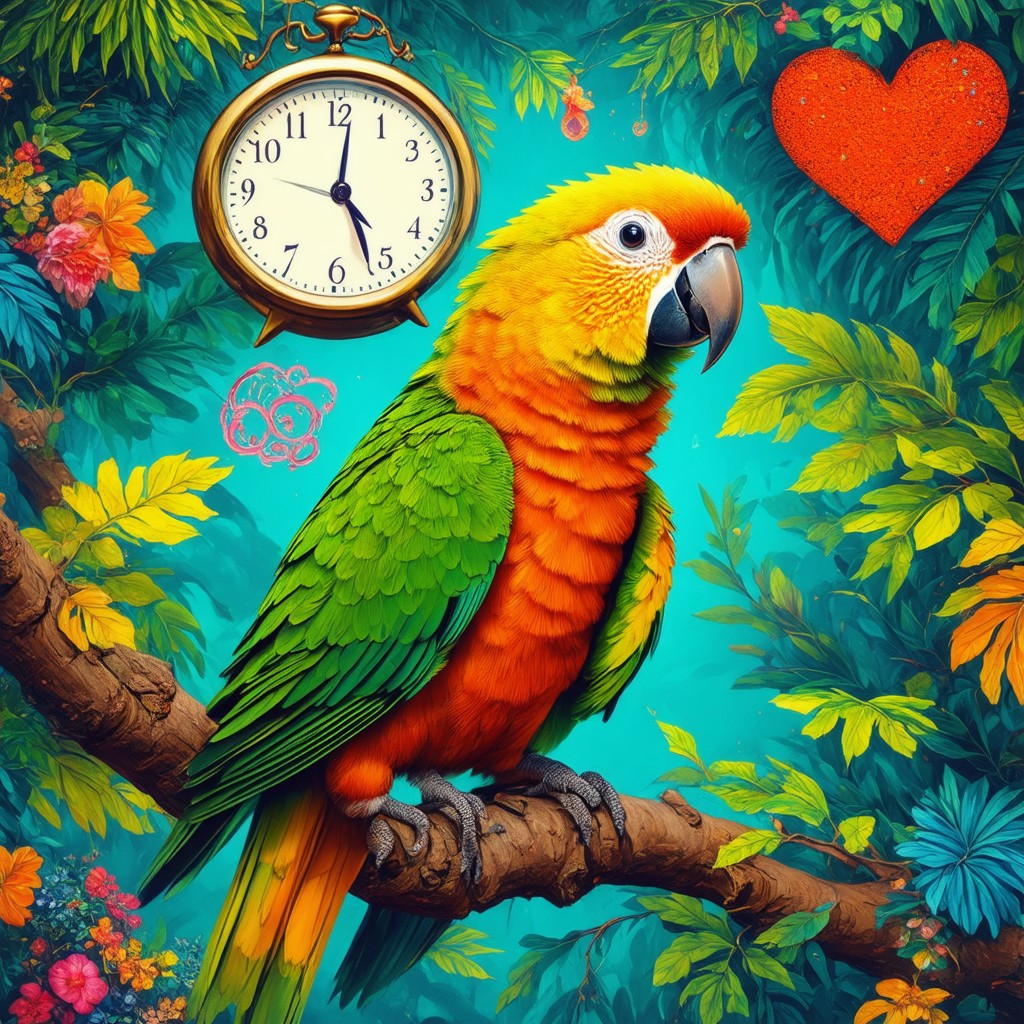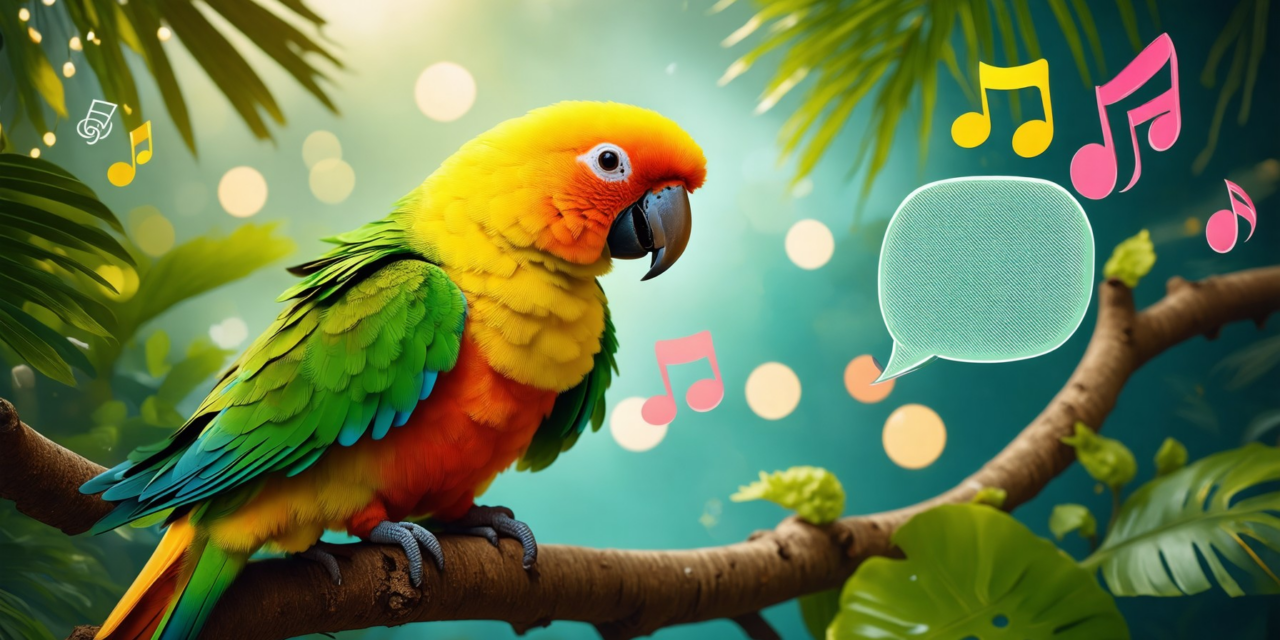Key Takeaways
- Understanding Costs: Owning a conure bird involves initial costs ranging from $300 to $800, depending on the species and source.
- Commitment to Care: Conures require a long-term commitment, with lifespans of 10 to 20 years, necessitating consistent care and social interaction.
- Social and Playful Nature: These birds are highly social, thriving on interaction, and are known for their affectionate behavior, making them excellent companions.
- Training Potential: With patience and positive reinforcement, conures can learn to mimic sounds and words, enhancing their communication skills.
- Species-Specific Traits: Different conure species, like the green-cheeked and sun conure, have unique characteristics, vocalization abilities, and care needs.
- Importance of Environment: Providing a spacious and stimulating environment is crucial for a conure’s health, happiness, and longevity.
Are you considering adding a conure bird to your family? This vibrant and affectionate pet can bring joy and companionship into your life, but it’s essential to understand what it takes to care for these lively creatures. In this comprehensive guide, we will explore everything you need to know about owning a conure, from the costs associated with bringing one home to their unique communication skills. We will delve into the characteristics of popular conure species, including the beloved green-cheeked conure, and discuss the benefits and challenges of having a conure bird as a pet. Additionally, we will provide insights into their dietary needs, lifespan expectations, and tips for training your conure to talk. Whether you’re a first-time bird owner or looking to expand your feathered family, this article will equip you with the knowledge you need to ensure a happy and healthy life for your conure.
Understanding the Benefits of Owning a Conure
Conures are increasingly popular as pets due to their vibrant personalities and engaging behaviors. Understanding the benefits of owning a conure can help potential pet owners make informed decisions about welcoming one of these delightful birds into their homes.
Characteristics of Conures
Conures are known for their playful and social nature, making them excellent companions for those who can dedicate time to interaction. Here are some key characteristics that highlight why conures can be great pets:
- Playful and Social: Conures thrive on interaction and enjoy playtime, which fosters a strong bond with their owners.
- Intelligent and Trainable: These birds are highly intelligent, capable of learning tricks and mimicking sounds, which enhances their relationship with owners through training sessions.
- Affectionate Nature: Conures often seek physical contact, providing emotional comfort to both the bird and its owner.
- Size Considerations: Typically medium to small, conures are suitable for various living environments, making them easier to handle for first-time bird owners.
- Longevity: With proper care, conures can live for 20 years or more, requiring a long-term commitment from their owners.
- Vocalization: While playful, some species, like the Sun Conure, can be quite loud, which may not suit all living situations.
- Messiness: Conures can be messy eaters, necessitating regular cleaning to maintain a hygienic living space.
- Time and Attention Needs: Daily interaction and mental stimulation are crucial for their well-being.
- Biting Potential: Although generally friendly, conures may bite if not properly socialized, emphasizing the importance of early training.
- Long-Term Commitment: Owning a conure involves significant responsibility due to their lifespan and social needs.
In summary, conures can make excellent pets for individuals or families willing to invest time and effort into their care. Their playful nature, intelligence, and affectionate demeanor can provide joy and companionship, but potential owners must also consider their noise levels, messiness, and the long-term commitment required.
Popular Conure Species
When considering a conure as a pet, it’s essential to explore the various species available. Each species has unique traits and characteristics that may appeal to different owners:
- Green-Cheeked Conure: Known for their playful demeanor and affectionate nature, green-cheeked conures are among the most popular types of conures. They are relatively quiet compared to other species, making them suitable for apartment living.
- Sun Conure: Recognized for their vibrant colors and loud vocalizations, sun conures are highly social and require plenty of interaction. Their playful antics make them a favorite among bird enthusiasts.
- Jenday Conure: Similar in appearance to the sun conure, jenday conures are known for their friendly disposition and love for socializing. They thrive in active households.
- Turquoise Green Cheek Conure: This striking variety of the green-cheeked conure is known for its beautiful coloration and charming personality, making it a sought-after choice for pet owners.
Choosing the right species is crucial for ensuring a harmonious relationship between the bird and its owner. For more insights on conure care and training, resources such as Avian Web and The World Parrot Trust can provide valuable information.

Communication Skills of Conure Birds
Conures are fascinating birds known for their vibrant personalities and ability to mimic sounds, but their talking ability varies significantly among species. Here’s a comprehensive overview:
- Talking Ability: While conures can mimic sounds, they are generally not as proficient at talking as other parrot species, such as African Grey Parrots or Amazon Parrots. Their vocalizations are often more about sound mimicry than forming coherent words.
- Species Variability: Certain conure species, particularly the Blue-Crowned Conure, are noted for having larger vocabularies and are considered better talkers within the conure family. Research indicates that individual species may have inherent differences in vocalization capabilities (Harrison, 2021).
- Training Techniques: With consistent training and patience, conures can learn to mimic words and phrases. Effective methods include:
- Repetition: Regularly repeating words and phrases in a clear, engaging manner can enhance learning.
- Positive Reinforcement: Rewarding your conure with treats or affection when they attempt to mimic sounds can encourage further vocalization (Smith, 2022).
- Individual Differences: Just like humans, individual conures have unique personalities. Some may be more inclined to learn to talk than others, influenced by factors such as genetics and early socialization experiences.
- Sound Mimicry: Beyond words, conures are adept at mimicking a variety of sounds, including laughter, whistles, and environmental noises. This ability showcases their intelligence and adaptability (Jones, 2023).
- Gender Differences: Anecdotal evidence suggests that male conures may have a slight edge in vocabulary acquisition compared to females, although this is not universally applicable.
- Age Considerations: Younger conures may begin to vocalize earlier, while older birds might take longer to develop their speaking abilities. The critical period for language acquisition in birds is often during their juvenile phase (Taylor, 2022).
- Communication Beyond Words: Conures communicate not only through vocalizations but also through body language and other sounds. Even if they do not learn to speak, they can form strong bonds with their owners through these interactions.
In conclusion, while conures may not be the best talkers among parrots, with the right training and environment, they can develop a charming repertoire of sounds and words. For more insights on bird training and behavior, consider consulting resources from avian behavior specialists or reputable pet care websites.
Talking Abilities of Different Conure Types
When exploring the talking abilities of various conure types, it’s essential to recognize that not all conures are created equal in their vocal skills. Here are some notable examples:
- Green-Cheeked Conure: This popular pet bird is known for its playful nature and can learn a few words and phrases, although they are not as talkative as some larger parrots.
- Blue-Crowned Conure: Often regarded as one of the better talkers among conures, the Blue-Crowned Conure can develop a more extensive vocabulary compared to its counterparts.
- Sun Conure: Known for their vibrant colors and social behavior, Sun Conures can mimic sounds and phrases, but their talking ability is generally limited.
- Jenday Conure: Similar to the Sun Conure, Jenday Conures are social and can learn to mimic sounds, though they may not be as proficient in speech.
Training Your Conure to Talk
Training your conure bird to talk can be a rewarding experience. Here are some effective strategies to enhance their vocal skills:
- Start Early: Begin training when your conure is young, as younger birds are often more receptive to learning.
- Use Clear Words: Choose simple, clear words or phrases that you want your conure to learn, and repeat them consistently.
- Engage in Interactive Sessions: Spend time interacting with your conure during training sessions. Use toys and treats to keep them engaged and motivated.
- Be Patient: Every bird learns at its own pace. Celebrate small victories and remain patient throughout the process.
Conure Bird Cost Breakdown
Understanding the conure bird cost is essential for potential pet owners. The price of a conure can vary significantly based on several factors, including the species, source, and location. Here’s a detailed breakdown:
- Breeder Prices: Purchasing a conure directly from a reputable breeder typically ranges from $300 to $600. It’s crucial to choose an ethical breeder who prioritizes the health and well-being of their birds. Ensure you visit the breeding facility to observe the living conditions and verify that the breeder does not sell unweaned birds. Ethical breeders often provide health guarantees and valuable information about care.
- Pet Store Prices: If you opt to buy from a pet store, prices can soar to $800 or more. The ethics of sourcing from pet stores can be questionable, as many do not prioritize the welfare of the animals. It’s advisable to research the store’s reputation and the conditions in which the birds are kept.
- Species Variations: Different species of conures have varying price points. For example, Green Cheek Conures are generally more affordable, while rarer species like the Sun Conure can be more expensive, sometimes exceeding $1,000.
- Additional Costs: Beyond the initial purchase price, consider ongoing costs such as food, toys, cage, and veterinary care. Quality pellets, fresh fruits, and vegetables are essential for a conure’s diet, and regular vet check-ups are necessary to maintain their health.
- Adoption Options: Consider adopting from a rescue organization, where fees can be significantly lower, often ranging from $50 to $200. This option not only saves money but also provides a home to a bird in need.
For more information on bird care and ethical sourcing, consult resources from organizations like Avian Web or The World Parrot Trust.
Average Lifespan of a Green Cheeked Conure
The average lifespan of a green cheeked conure is typically between 10 to 15 years, although some can live even longer with proper care. Factors that influence their lifespan include diet, environment, and healthcare. Providing a balanced diet rich in nutrients, a spacious and safe cage, and regular veterinary check-ups can significantly enhance their longevity. Additionally, mental stimulation through toys and social interaction is crucial for their well-being.
For more insights on conure care, you can explore articles on our blog.
Challenges of Owning a Conure
Owning a conure bird can be a rewarding experience, but it also comes with its share of challenges. Understanding these potential issues is crucial for anyone considering bringing a conure into their home. From behavioral quirks to specific care requirements, being informed can help ensure a harmonious relationship with your feathered friend.
Common Issues with Conure Behavior
Conures, particularly the popular green-cheeked conure, are known for their playful and affectionate nature. However, they can also exhibit behaviors that may be challenging for owners:
- Noise Levels: Conures are vocal birds, and some species, like the sun conure, are known for their loud calls. This can be problematic in quiet living situations, such as apartments, where noise sensitivity is a concern.
- Social Needs: These birds thrive on social interaction. If left alone for extended periods, conures may develop behavioral issues, including aggression or feather plucking. Regular interaction and mental stimulation are essential for their well-being.
- Potential for Aggression: While generally friendly, conures can display aggressive behavior, particularly during mating season or if they feel threatened. Proper training and socialization are vital to mitigate these tendencies.
Space and Cage Requirements for Conures
Providing an appropriate living environment is crucial for the health and happiness of your conure. Here are some key considerations:
- Cage Size: Conures need a spacious cage that allows them to move freely, stretch their wings, and play. A cramped environment can lead to stress and health issues.
- Safe Play Areas: In addition to a large cage, conures require safe spaces for exercise outside their cage. This includes supervised playtime in a bird-proofed area to prevent accidents.
- Environmental Enrichment: Toys, perches, and climbing structures are essential for keeping your conure mentally stimulated. Boredom can lead to destructive behaviors, so providing a variety of engaging activities is important.

Conure Bird Lifespan
Understanding the lifespan of a conure bird is crucial for potential owners. Conures, particularly the green-cheeked conure, can live for 20 years or more with proper care. This long lifespan means that adopting a conure is a significant commitment, requiring attention to their health and well-being throughout their life stages.
Factors Affecting the Lifespan of Conures
Several factors can influence the lifespan of conures, including:
- Diet: A balanced diet is essential for a healthy conure. High-quality pellets, fresh fruits, and vegetables contribute to their overall health. Research from the Avian Web emphasizes the importance of nutrition in extending a bird’s life.
- Environment: Providing a spacious and stimulating environment is vital. A large cage with toys and perches allows conures to exercise and explore, which is crucial for their physical and mental health.
- Healthcare: Regular veterinary check-ups are necessary to monitor health and prevent diseases. The American Veterinary Medical Association highlights the importance of preventative care in pet birds.
- Social Interaction: Conures are social creatures that thrive on interaction. Daily engagement helps prevent behavioral issues and contributes to their emotional well-being.
Tips for Ensuring a Long Life for Your Conure
To help your conure live a long and healthy life, consider the following tips:
- Provide a Balanced Diet: Ensure your conure receives a variety of foods, including high-quality pellets and fresh produce.
- Regular Exercise: Allow your conure time outside the cage for exercise and exploration. This helps maintain their physical health.
- Socialization: Spend quality time with your conure daily to strengthen your bond and keep them mentally stimulated.
- Routine Vet Visits: Schedule regular check-ups with an avian veterinarian to catch any health issues early.
By following these guidelines, you can help ensure that your green-cheeked conure bird enjoys a long, fulfilling life as part of your family.
Conure Bird Lifespan
Understanding the lifespan of a conure bird is essential for prospective owners. Conures are known for their vibrant personalities and social nature, but their longevity can vary significantly among different species. Generally, the average lifespan of a green-cheeked conure is around 15 to 20 years, making them a long-term commitment for pet owners.
Factors Affecting the Lifespan of Conures
Several factors can influence the lifespan of conures, including:
- Diet: A balanced diet rich in fruits, vegetables, and high-quality pellets is crucial for maintaining health. Poor nutrition can lead to various health issues that shorten lifespan.
- Environment: Providing a safe and stimulating environment, including appropriate cage sizes and enrichment activities, can significantly impact a conure’s well-being.
- Healthcare: Regular veterinary check-ups and prompt treatment of any health concerns are vital. Conures are prone to certain diseases, and early detection can improve their quality of life.
- Social Interaction: Conures are social birds that thrive on interaction. Loneliness or lack of mental stimulation can lead to stress and behavioral issues, affecting their overall health.
Tips for Ensuring a Long Life for Your Conure
To help your conure live a long and healthy life, consider the following tips:
- Provide a Balanced Diet: Ensure your conure has access to a variety of foods, including fresh fruits, vegetables, and high-quality pellets designed for conures.
- Regular Exercise: Allow your conure ample time outside of the cage to fly and explore in a safe environment. This promotes physical health and mental stimulation.
- Socialization: Spend quality time with your conure daily. Engage in play and training sessions to strengthen your bond and keep them mentally active.
- Routine Veterinary Care: Schedule annual check-ups with an avian veterinarian to monitor your conure’s health and address any concerns early.
Conure Bird Lifespan
Understanding the lifespan of a conure bird is crucial for potential owners. Conures, known for their vibrant personalities and playful nature, can live for many years with proper care. The average lifespan of a green-cheeked conure, one of the most popular types of conures, ranges from 10 to 15 years. However, with optimal care, some green-cheeked conures can live even longer, reaching up to 20 years.
Factors Affecting the Lifespan of Conures
Several factors influence the lifespan of conures, including:
- Diet: A balanced diet rich in fruits, vegetables, and high-quality pellets is essential for a healthy conure. Poor nutrition can lead to health issues that shorten their lifespan.
- Environment: A safe and stimulating environment, including a spacious cage and opportunities for social interaction, contributes to a longer life. Stressful conditions can negatively impact their health.
- Healthcare: Regular veterinary check-ups and prompt treatment of any health issues are vital. Preventative care can help catch potential problems early.
- Genetics: Some conure species may have genetic predispositions to certain health conditions, which can affect their longevity.
Tips for Ensuring a Long Life for Your Conure
To help your conure live a long and healthy life, consider the following tips:
- Provide a Nutritious Diet: Ensure your conure’s diet includes a variety of fresh fruits, vegetables, and high-quality pellets specifically formulated for conures.
- Regular Exercise: Allow your conure ample time outside of its cage for exercise and mental stimulation. Interactive toys and playtime can enhance their well-being.
- Social Interaction: Spend quality time with your conure daily. These birds thrive on social interaction, which can reduce stress and promote happiness.
- Maintain a Clean Environment: Regularly clean your conure’s cage and living area to prevent the buildup of bacteria and parasites.













